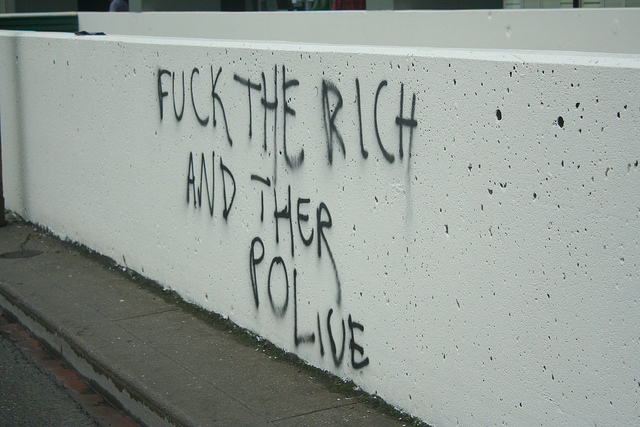Many believe that Donald Trump’s apparent victory in the Republican primaries will ultimately lead to the party’s downfall. Others have countered that Hillary Clinton’s unpopularity with independent voters and the young people who support Bernie Sanders means the GOP might yet have the last laugh in November. But there is another way of looking at the surprising outcomes of the wearisomely protracted nominating process.
What if, superficial indications to the contrary, it is not the Republican Party in danger of breaking up, but their Democratic rivals? After all, despite the overt displeasure that prominent GOP mover-and-shakers have communicated about Trump, most conservatives are lining up behind his candidacy. On the Left, by contrast, Bernie Sanders’ surprisingly strong bid to complicate Clinton’s pathway to the nomination is creating more rancor with each passing day.
Party insiders and the pundits who stand in for them within the mainstream media worry publicly about the damage Sanders is doing to Hillary’s brand, not to mention her campaign’s bank account. They keep arguing that it is time for everyone who fears Republican domination of all three branches of the Federal government to rally around her, setting aside whatever differences they may have in the interest of party discipline.
Yet whereas the prospect of another Clinton presidency seems to be doing a remarkable job of reducing divisiveness among conservatives, the same cannot be said for the nightmarish vision of a White House remade in the image of Trump Tower. To be sure, those pundits and party insiders have been trying to achieve this effect. But the most politically active progressives have so far refused to be frightened into subservience.
No doubt a sizeable percentage of them would, in the end, decide to vote for Hillary in order to protect the nation — and the world — from the Donald. However the reluctance to do so that they are expressing right now, as the party conventions approach, is reinforcing the impression that she is a flawed candidate, perhaps fatally so, one that is powerfully reinforced by the current scandal surrounding her use of a private e-mail server while Secretary of State and its many predecessors during her husband’s two terms in Washington.
Finding analogies for this awkward situation in the Democratic Party’s past is not difficult. Senator Edward Kennedy’s strong primary challenge to incumbent President Jimmy Carter in 1980 comes to mind. So does the predicament it faced in 1968 when Lyndon B. Johnson, despite having won in a landslide in 1964 and done a great deal to realize the promise of John F. Kennedy’s “Camelot”, was so weakened by the war in Vietnam that he decided not to run for reelection. But possibly the best comparison to make is Bill’s second term, when the relentless investigation of his sexual improprieties compromised the Clinton brand from one direction just as his repeated concessions to conservative desires undermined it from the other.
Faced with the difficulty of carving out an identity for himself independent of the Clintons, Vice President Al Gore was unable to maximize his support among potential Democratic voters in swing states, particularly people of color who still tended to like Bill a good deal despite his retrograde moves on social welfare and criminal justice. Distancing himself from the president did present an opportunity to win over left-leaning independents who felt disrespected and ignored by the centrist policies that the Clinton Administration had worked so hard to implement. But Gore was unable to inspire much enthusiasm in this important demographic, opening the door for Ralph Nader’s third-party candidacy.
Running as a Green, although his ties to the party’s infrastructure were not well developed, Nader excited people who were tired of both Republican and Democratic leaders promoting what we would now call a neoliberal agenda. Known for decades as a figure of rectitude — or, as his detractors preferred, self-righteousness — he served as a potent symbol for resisting business as usual. That’s why many of the most progressive Democrats and their fellow travelers outside the party publicly declared their willingness to vote for Nader, even it meant conceding the presidency to George W. Bush.
The same sort of vitriol currently being directed at supporters of Bernie Sanders who say they might not vote for Hilary Clinton was targeted at those who were backing Nader. With the benefit of hindsight, it is plausible to conclude that some of the people who voted for him in Florida and New Mexico cost Gore the presidency. In the months leading up to the 2000 election, however, the likelihood of the outcome being too close to call seemed remote, leading many to propose that a protest vote against the Democratic candidate could allow progressives to voice their displeasure with the political establishment without putting the composition of the Supreme Court at risk.
It is important to remember that the political fractures on the Left that opened up in the summer of 2000 were prefigured by the massive protests against the World Trade Organization that took place in Seattle the previous November. “New Democrat” Bill Clinton and his “New Labour” counterpart Tony Blair were regarded by members of the anti-globalization movement as the worst kind of hypocrites, publicly advocating for humanitarian values even as they worked behind the scenes to construct and sustain networks of exchange that would consistently prioritize economic freedoms over all other concerns.
Also worth recalling is that Al Qaeda, in its own benighted way, had been articulating a similar critique for some time. The fact that its leadership had chosen the World Trade Center as a target back in 1993 was no accident. Bill Clinton was new to the White House then, just as George W. Bush would be on September 11th, 2001, and therefore in a position of perceived vulnerability. That first attack failed, of course, and Clinton would spend two terms reaping the benefit of the post-Cold War New World order, even as Republicans who agreed with many of his positions on economic and social issues relentless savaged both him and his wife for being “socialists”. Although that designation was more the product of rhetorical maneuvering than a coherent critique of the New Democrats’ ideology, it served rather splendidly to reinforce the belief of many progressives that he and his cronies, Hillary included, were the worst kind of sell-outs.
Interestingly, the eventual impact of Al Qaeda’s successful attacks around the world during George W. Bush’s two terms in office was to subject him to a similar critique by self-proclaimed true conservatives, who bemoaned the expansion of government pursued under the auspices of a war economy and lamented the concomitant lack of investment in advancing a moral agenda. In other words, Bush ended up being called a “sell out” as well, a charge that continued to resonate through the 2016 Republican primaries and helped to drive his younger brother Jeb from the race.
Viewed dispassionately, this symmetry seems to reveal hidden patterns that continue across party lines. Although Democrats were fond of saying that things might have been different if Al Gore had won the disputed 2000 election, the likelihood is strong that Al Qaeda would have tried to execute its plan — and likely succeeded — regardless of who had won the White House. It also facilitates the discerning of connections between the outsider candidates that bookended the Clinton presidency, Ross Perot in 1992 and Ralph Nader in 2000, and Bernie Sanders, who was serving in Congress throughout that period.
While Donald Trump has shaken up the whole Republican Party in 2016, taking on one sacred cow after another, its neoliberal wing has suffered the worst damage. Because many of its biggest individual and corporate donors are identified with that wing, this initially appears to be a foolish strategy. Yet when we consider the degree to which Trump has managed to transfer the mantle of neoliberalism to Hillary Clinton in the process, his prospects seem more sanguine.
Ever since Trump became the presumptive nominee, he has been using social media to troll supporters of Bernie Sanders, telling them how bad he feels that the Democratic Party establishment has treated them poorly. Although such moves are unlikely to win over anyone who has a history of progressive political positions, they could have an impact on independent voters who were drawn to Sanders for the same reasons that they were drawn to Trump: the fact that both men seem comfortable speaking their minds about the dangers of too much border-crossing.
Trump’s superficially idiotic insistence on building a huge wall on the U.S.-Mexico border, a proposal that simply can’t be pulled off under present circumstances, does double duty as a kind of metaphor for turning back the clock to a time before NAFTA and other global trade agreements. And, in that regard, it overlaps with the pronouncements that Bernie Sanders has been making on the campaign trail about how the American worker has suffered in the past few decades. For some potentially crucial voters in swing states, this commonality matters more than the obvious differences between the two candidates on just about every other topic.
The question these next six months will answer is whether Hillary Clinton’s association with the most reviled trade moves of the past three presidencies will hurt her enough to make it possible for Donald Trump to overcome his many disadvantages. If the leaders of the Democratic Party refuse to acknowledge the grave doubts about economic policy stirred up by both him and Bernie Sanders, the end result could be a strengthening of the Republican stranglehold on the Federal government. And what at first looked like a GOP-shattering landslide victory for Clinton might instead end up as a death knell for the Democratic party instead.
Photograph courtesy of Flickr user Katerkate. Published under a Creative Commons License.





